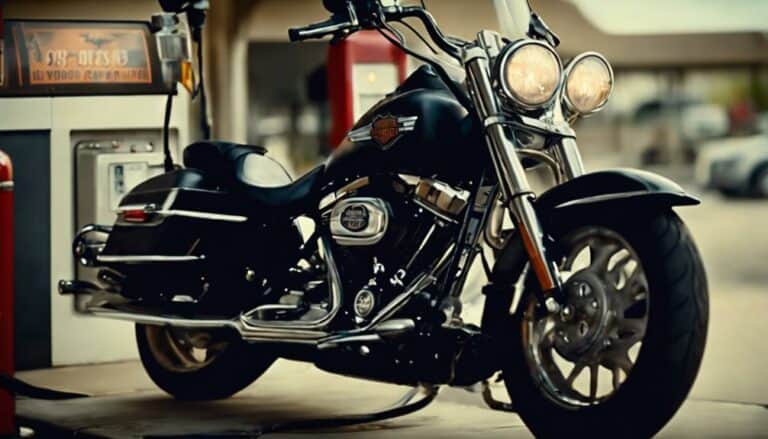If you've ever wondered what type of gas your Harley-Davidson requires, you're not alone. The fuel choice for your Harley goes beyond just a simple trip to the gas station.
Understanding the specific needs of your motorcycle can impact its performance. So, before you twist that throttle, let's explore the nuances of fueling your Harley-Davidson to ensure a smooth ride every time.
Key Takeaways
- Premium unleaded gas recommended for all Harley models for optimal performance.
- High octane fuel necessary for high compression engines like the 1200cc Evolution.
- Choosing the correct octane level prevents knocking and ensures efficient combustion.
- Ethanol-free gas or ethanol stabilizers advised to prevent corrosion in fuel systems.
Harley-Davidson Fuel Recommendations
Harley-Davidson strongly recommends utilizing premium unleaded gasoline for all fuel-injected models to ensure optimal performance and engine longevity. High-performance Harley engines, such as the 1200cc Evolution engine and the 1247cc Revolution engine, require high octane fuel due to their high compression ratios. Engines with a compression ratio of 10:1 or higher fall into the category of high compression engines, necessitating the use of high octane gasoline to prevent premature ignition and knocking.
The utilization of premium gas in Harley-Davidson motorcycles with fuel injection systems is crucial for maintaining the engine's efficiency and power output. The fuel's octane rating directly impacts the engine's combustion process, ensuring that it operates smoothly without issues related to detonation. By following Harley-Davidson's recommendation of using premium unleaded gasoline, riders can be confident that their bikes will deliver the desired performance while also safeguarding the engine against potential damage.
Understanding Octane Ratings for Harley
When considering the optimal fuel choice for your Harley Davidson motorcycle, understanding octane ratings is essential for maximizing performance and engine efficiency. Harley-Davidson, known for its high compression engines, typically recommends using premium unleaded gasoline to ensure proper operation. High octane fuel is crucial for engines with a compression ratio of 10:1 or higher, as it helps prevent knocking and pinging, ultimately leading to better performance.
While some models like the 103ci Twin Cam can run on 87 octane due to a lower compression ratio, larger engines like the 1200cc Evolution and 1247cc Revolution benefit from higher octane options. Using ethanol-free gas can also be advantageous as ethanol fuel may not provide the same level of efficiency for Harley engines designed to run on pure gasoline.
Therefore, choosing the right octane rating, such as premium gas, is vital for ensuring your Harley Davidson operates at its best.
Factors Influencing Harley's Fuel Choice
Premium unleaded gasoline with high octane levels is crucial for ensuring optimal performance and longevity of your Harley's high compression engine. The high compression engines in Harley motorcycles benefit from the resistance to premature combustion provided by high octane fuel. Using premium fuel with higher octane levels helps maintain optimal engine performance and longevity by reducing the risk of engine knocking and other issues. Harley-Davidson recommends using premium unleaded gasoline for all fuel-injected models to ensure efficient engine operation. Newer Harley models are equipped with ethanol-resistant parts to mitigate any potential negative effects of ethanol content in fuel on engine components.
| Factor | Influence | Importance |
|---|---|---|
| Octane Level | Resists premature combustion in high compression engines | High |
| Premium Fuel | Maintains optimal performance and longevity | High |
| Ethanol Content | Requires ethanol-resistant parts in newer models | Resistance |
| Recommended | Ensures efficient engine operation | High |
| Compression | Benefits from high octane fuel | High |
Ethanol and Harley-Davidson Motorcycles
When operating a Harley-Davidson motorcycle, it's essential to be mindful of the potential effects of ethanol present in E10 fuel on the fuel system components. Ethanol in E10 fuel can lead to corrosion in the fuel system of Harley-Davidson motorcycles, particularly in older models that may not have ethanol-resistant components.
To combat this, newer Harley models are designed with components that can withstand the corrosive nature of ethanol. For older models, using stabilizer additives can help mitigate the damage caused by ethanol in the fuel.
It's important to note that E10 fuel contains less energy than pure gasoline, resulting in lower fuel efficiency for Harley-Davidson motorcycles.
To avoid ethanol-related problems altogether, consider using non-ethanol fuel, especially if you own an older Harley model that's more susceptible to ethanol-related issues. By being proactive and aware of the impact of ethanol on your Harley's fuel system, you can ensure optimal performance and longevity for your motorcycle.
Tips for Fueling Your Harley Davidson
For optimal performance and longevity of your Harley Davidson motorcycle, it's crucial to follow specific fueling tips recommended by Harley-Davidson.
Harley owners with high compression engines should always choose premium unleaded gasoline to ensure optimized performance. The high compression engines in Harley motorcycles require high octane fuel for efficient combustion, especially if the compression ratio is 10:1 or higher.
Using the correct octane level, typically 91 or higher, is essential to prevent knocking and ensure proper engine operation. Premium fuel not only helps prevent premature combustion and engine damage but also guarantees smooth performance in your Harley-Davidson motorcycle.
Conclusion
So next time you fill up your Harley Davidson, remember to treat it like the high-performance machine it is.
Don't skimp on the gas – give it the premium fuel it deserves to keep roaring down the road without missing a beat.
Your Harley will thank you with smooth rides and powerful performance that will make heads turn.
Ride on, and fuel up right!

